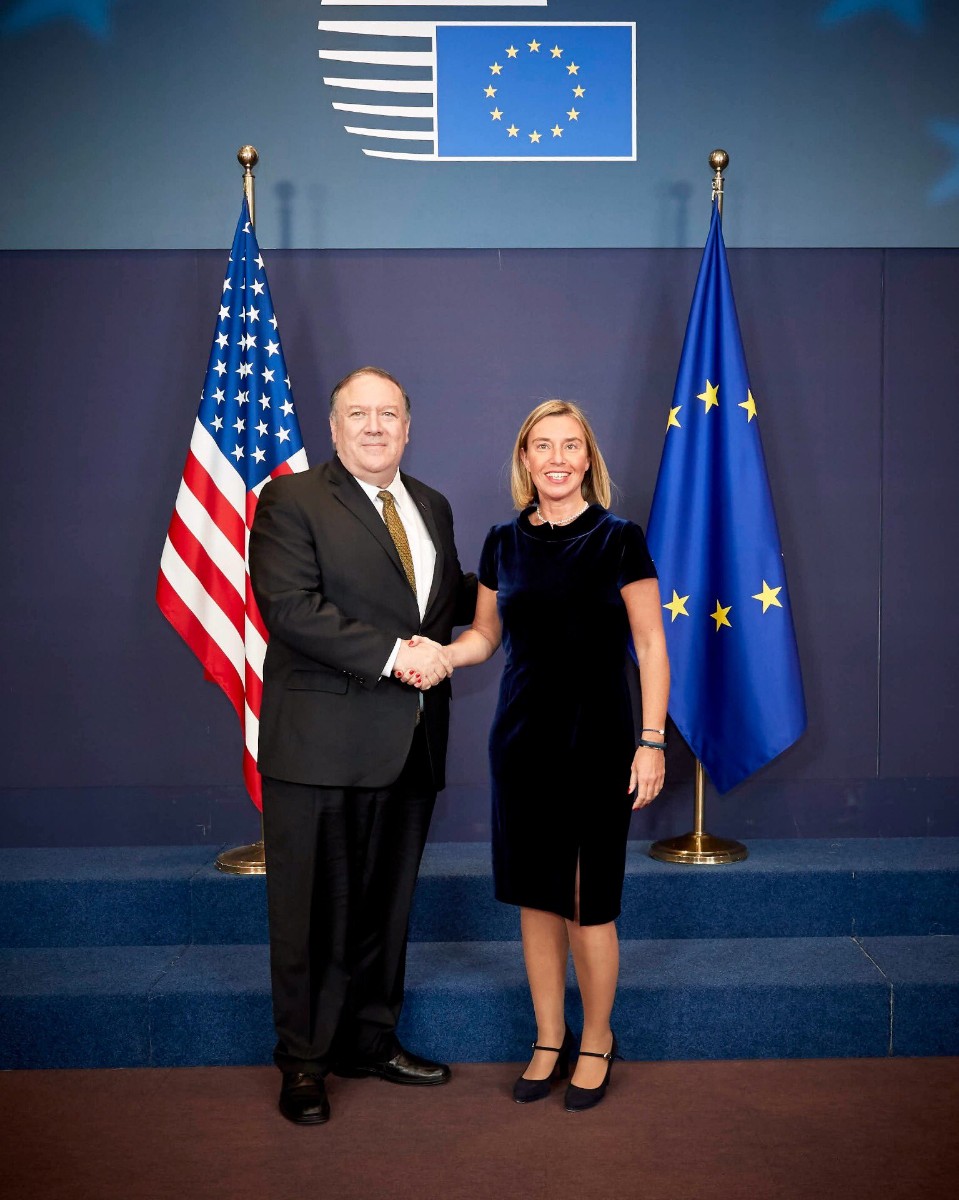 Photo Courtesy: Federica Mogherini on Twitter
Photo Courtesy: Federica Mogherini on Twitter
How Can the EU Help “Deal” with Iran?
Just a few days ago, Iranian President Hassan Rouhani declared that, if all the signatories of the JCPOA won’t reconfirm their commitment to the agreement by protecting Iran against the economic sanctions re-imposed by the US, Iran will resume its production of fissile material. More specifically, Rouhani threatened to halt the sale of Iran’s highly enriched uranium surplus, so that Iran can use it itself.
China and Russia have both blamed the US, since its decision to end exemptions from sanctions for some of Iran’s most relevant customers caused its currency to lose two-third of its value. In an attempt to dictate his conditions, then, Rouhani demanded the EU, China and Russia honor their financial and oil commitments within 60 days.
The EU was definitely not pleased with this ultimatum, and its resolute response to Iran demonstrated its determination in keeping constructive relationships with both Iran and the US. Be that as it may, judging from Iranian Foreign Minister Javad Zarif’s rhetoric, it would appear the ball is now in the EU’s court. But what can the EU do to help ease the tensions, while safeguarding its own best interests?
As confirmed by British Foreign Secretary Jeremy Hunt, the EU’s main priority remains making sure Iran doesn’t go down “the path to renuclearization.” Especially considering the high level of instability that permeates that geographic area, having Iran or any of its neighboring countries consider building a nuclear arsenal is the last thing anyone needs.
Behrouz Kamalvandi, spokesman of the Atomic Energy Organization of Iran, recently confirmed his country doesn’t intend to expand the capacity of centrifuges used to enrich uranium, and still intends to welcome IAEA inspections on its territory. If that’s true, then there’s no reason for the EU to aggravate its relationship with Iran and interrupt its profitable economic transactions.
Even though the EU can’t unilaterally solve the problem, there are a few avenues it could explore.
For one, the EU could make sure the surplus enriched uranium produced by Iran is sold abroad, and that the country is only left with material meant for the production of nuclear power.
The EU could also invest some effort in enforcing the Blocking Statute that was approved last August, which was intended to prevent the application of a law made by a foreign country on another jurisdiction.
Moreover, the EU could implement Instex, which was meant for the precise purpose of easing transactions between Iran and the EU, skirting the re-established US sanctions. Some suggest the EU could resort to Instex to assist Iran boost crude sales and perhaps even negotiate oil-for-good accords similar to the ones Iran arranged with Russia.
Overall, it’s important to remember the EU does have “economic leverage over Iran,” and it’s therefore capable of persuading it to remain in compliance with its nuclear program.
That’s not all. The EU also has a lot of influence over the US and, because of the dreadful consequences of a potential interruption of all agreements and communications with Iran, the EU may use such influence to mitigate the US’ recent policies.
While the EU agrees with the US that Iran’s development of ballistic missiles is a dangerous and bellicose activity which needs to be ceased at once, it does not support the US’ decision to leave the JCOPA or its determination to re-establish economic sanctions on Iran. By leaving the deal and taking measures to undermine its effectiveness, the US may succeed in pushing its own allies into the awkward position of protecting Iran.
To deescalate, a good place for the US to start would be dropping its posturing against Iran. Over the past month, the US labeled Iran’s Revolutionary Guard a “terrorist group,” moved nuclear-capable B-52 bombers to Qatar, and announced it will deploy an aircraft carrier to the Middle East. What’s more, there’s been speculation that the US might send up to 120,000 troops to the region should Iran attempt a military confrontation with the US or resume its enrichment program – the White House has, however, denied such conjecture. These efforts currently serve to reinforce Iranian paranoia and increase the desire for a nuclear deterrent.
Iran is anything but faultless – one need only consider Iran’s endorsement of the Assad regime in Syria and its support for transnational terrorist organizations. With that being said, fixing all that’s wrong with Iran has never been the JCPOA’s objective – its only goal was restricting Iran’s nuclear program and, to this day, the deal has proved effective.
For now, there is some reassurance in knowing Rouhani said Iran wishes to remain in the JCPOA – as leaving would erase the safety measures enforced against Iran’s nuclear program. While that is a relief, it’s important all parties involved put aside their domestic interests and co-operate for the achievement of a greater good – perhaps, the US will realize the EU is a more competent and valuable ally for this purpose than it often gives it credit for.





